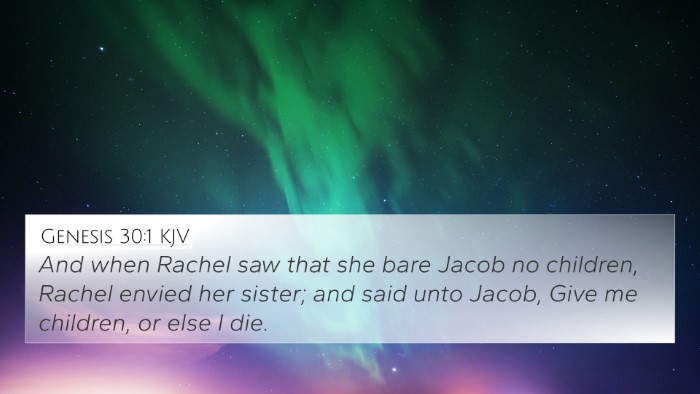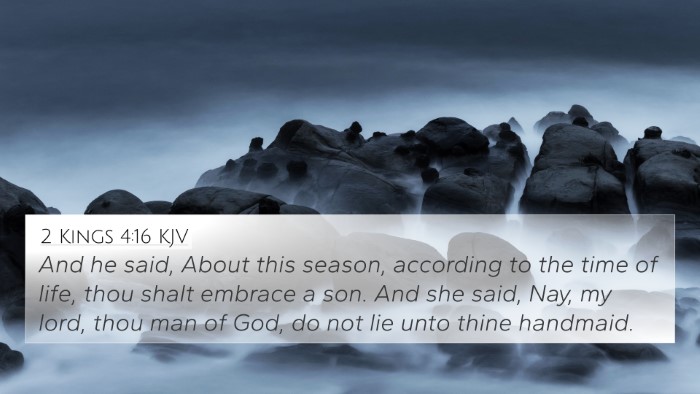Understanding 2 Kings 4:28
2 Kings 4:28 states: "Then she said, Did I desire a son of my lord? did I not say, Do not deceive me?" This verse captures a poignant moment of a mother's grief and disappointment, highlighting the deep emotional turmoil experienced by the Shunammite woman regarding her son’s condition.
Contextual Overview
The context of this verse is crucial for understanding its meaning. The Shunammite woman, known for her hospitality towards the Prophet Elisha, is confronted with devastating news - her child is dead. Her response to Elisha reveals a blend of sorrow and disbelief, questioning the promise that she received from him.
Commentary Insights
-
Matthew Henry:
Henry emphasizes the desperation in the woman’s words, suggesting that her profound anguish arises from her earlier request not to be deceived regarding the promise of a son. She feels betrayed and is grappling with the painful reality that contradicts her hope.
-
Albert Barnes:
Barnes notes the woman's expression of a sharp grief and the sense of loss that comes from unfulfilled expectations. Her questions reflect a longing for clarity and understanding, making her situation more relatable to readers who may experience similar struggles.
-
Adam Clarke:
Clarke reflects on the cultural implications of the woman's plea. In ancient Israel, children were seen as a blessing, and the loss or death of a child could signify the loss of legacy and hope for the future. Her anguish is not just personal, but theological, as it questions divine promise.
Bible Verse Cross-References
This verse connects powerfully with several other scripture passages, illustrating thematic continuities throughout the Bible:
- 1 Kings 17:17-24: The story of Elijah raising the widow’s son highlights similar themes of loss and restoration.
- 2 Kings 4:35: Elisha’s actions following this verse continue the narrative of miraculous healing.
- Luke 7:12-15: Jesus raises the widow of Nain's son, reinforcing the theme of hope amidst despair.
- Matthew 15:25-28: The persistence of the Canaanite woman reflects deep faith in the face of despair.
- Romans 8:28: This New Testament verse addresses the goodness of God in all situations, tying back to the theme of divine providence.
- Job 14:1: Job reflects on the fragility of life, resonating with the Shunammite woman's experiences.
- John 11:21-27: Martha’s dialogue with Jesus after Lazarus’s death mirrors the plea for answers in times of grief.
Thematic Bible Verse Connections
This verse becomes a part of a larger narrative that explores themes of grief, disappointment, and divine intervention. It connects with:
- The Fragility of Life: The Shunammite’s lament parallels broader biblical narratives that highlight human frailty.
- Hope and Restoration: The eventual resurrection of her son introduces restoration as a recurring motif in the Scripture.
- The Role of Faith: It presents the importance of faith in God amidst dire circumstances, encouraging believers to seek understanding through their trials.
Applying Cross-Referencing in Study
For those interested in deeper scriptural understanding, tools for Bible cross-referencing are invaluable. They help identify connections between Old and New Testament themes, such as:
- Using a Bible concordance to find related verses.
- Engaging in comparative Bible verse analysis to uncover thematic similarities.
- Utilizing a Bible cross-reference guide for sermon preparation, allowing for a richer exploration of the texts.
Conclusion: Inter-Biblical Dialogue
Ultimately, 2 Kings 4:28 invites readers to engage in inter-Biblical dialogue, encouraging the discovery of how this verse and similar ones can inform faith and understanding. Through diligent study and cross-referencing, believers can uncover a deeper relational context within Scripture that reinforces the divine promise of hope and restoration.




